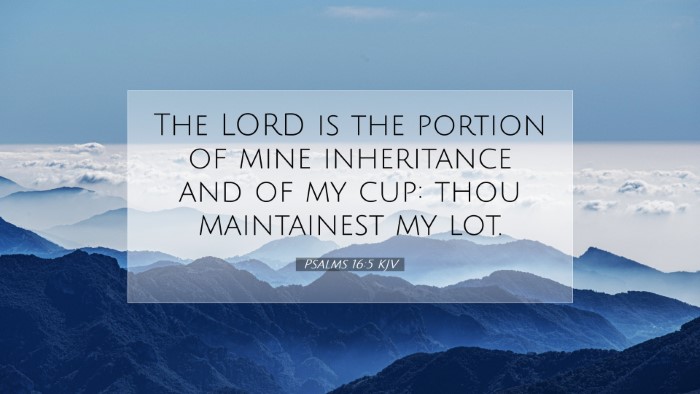Psalms 16:5 Commentary
Verse Text: "The Lord is the portion of mine inheritance and of my cup: thou maintainest my lot."
Introduction
The Psalmist David expresses profound confidence in the Lord, recognizing Him as his ultimate source of sustenance and inheritance. This verse articulates a foundational principle of faith: that true security and fulfillment come from God.
Comprehensive Overview
This verse encapsulates two primary themes: inheritance and divine provision. David's proclamation acknowledges God as his spiritual and material sustenance, reflecting a deep relationship characterized by trust and reliance.
- Inheritance: The metaphor of inheritance denotes the spiritual blessings and promises that God bestows upon His people.
- The Cup: Symbolically represents God's blessings and, at times, the trials that a believer may face as they follow the Lord.
- Maintaining My Lot: Highlights God's ongoing involvement in the lives of His people, ensuring that they receive what is due to them in accordance with His will.
Insights from Matthew Henry
Matthew Henry emphasizes that the portion we receive from the Lord is far better than any earthly inheritance. His commentary indicates that God's portion offers spiritual richness, security, and lasting joy.
Henry observes how the phrase "thou maintainest my lot" reflects God's active role in preserving the believer's path. This assurance allows David to express an unwavering trust in divine providence despite external circumstances.
Insights from Albert Barnes
Albert Barnes expands on the expression of God as our portion, noting that this portrays a deep relational dynamic between God and the believer. He articulates that this portion is not merely about material inheritance but of spiritual wealth that brings peace and assurance.
Barnes also highlights the significance of God maintaining our lot. He suggests that while challenges may arise, it is God who directs our fate. The believer’s trust in God’s sovereignty is pivotal in navigating life's trials.
Insights from Adam Clarke
Adam Clarke’s commentary sheds light on the cultural implications of the term “cup.” He explains that the cup traditionally represents one's share of blessings and burdens. In this sense, the Psalmist not only acknowledges God's blessings but also the reality of life's trials.
Clarke notes that the declaration "the Lord is my portion" reflects a deep conviction that God’s presence and guidance are sufficient, rendering all earthly pursuits secondary. This assurance leads to a life characterized by gratitude and unwavering faith.
Theological Implications
This verse touches on several theological themes that have practical implications for Christians:
- The Nature of God: It affirms God as a personal, sustaining presence in the believer's life.
- The Concept of Inheritance: Links the believer's spiritual heritage to God’s promises, underscoring the idea of being heirs with Christ.
- Divine Providence: It illustrates God's active role in guiding and maintaining the lives of His followers.
Practical Applications
For pastors, students, and theologians, this verse serves as a reminder to encourage faith in God's provision. The concept of God as our portion should inspire believers to seek intimacy with Him over material gain.
Moreover, the realization that God maintains our lot invites believers to surrender worries and anxieties regarding the future, resting in the assurance of His sovereignty. Implementation of these truths can transform both personal faith and community worship.
Conclusion
Psalms 16:5 encapsulates a beautiful declaration of faith, where David confidently proclaims God as his inheritance. This verse continues to resonate for believers today, encouraging a deep trust in God’s provision and presence.
As we reflect on this profound truth, may our approach to life, ministry, and relationships shift to reflect the security found in God alone.


